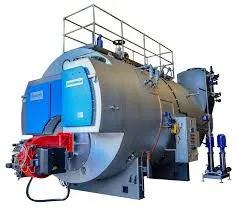
ធ្នូ . 16, 2024 11:10 Back to list
what is a biomass heating system
What is a Biomass Heating System?
A biomass heating system is an innovative and sustainable method of generating heat by burning organic materials, such as wood, agricultural residues, and other biological matter. As the world seeks alternatives to fossil fuels, biomass systems are gaining momentum as an eco-friendly option that not only provides energy but also contributes to reducing greenhouse gas emissions and promoting a circular economy.
How Biomass Heating Works
At its core, a biomass heating system operates similarly to traditional heating systems that use fossil fuels. The primary difference lies in the fuel source. Biomass fuels can come from various organic materials, including wood pellets, chips, logs, and even waste products from agricultural and forest operations.
The process begins with the combustion of these organic materials in a boiler or furnace. As the biomass burns, it produces heat, which is then used to generate hot water or steam. This heat can be directed into a building's heating system, supplying warmth during cold weather. In larger applications, such as district heating systems, multiple buildings can be heated from a single biomass boiler.
Types of Biomass Heating Systems
There are several types of biomass heating systems available, including
1. Wood Pellet Boilers These systems use compressed wood pellets, which are easy to handle and store. They provide a consistent and efficient heat output and are often automated for ease of use.
2. Wood Chip Boilers Utilizing larger chips of wood, these boilers require more space for both storage and operation. They are commonly used in larger-scale applications like schools or hospitals.
3. Log boilers These are designed to burn logs directly. They often have a higher capacity for storing fuel but require more manual intervention in terms of loading and maintenance.
4. Biomass stoves These are smaller systems that can heat single rooms or small homes. They are typically designed to burn pellets or logs.
5. Combined Heat and Power (CHP) Some biomass systems are designed to generate both heat and electricity simultaneously, making them highly efficient and versatile.
what is a biomass heating system

Advantages of Biomass Heating Systems
Biomass heating systems offer numerous advantages
1. Sustainability Using renewable materials means that biomass energy is often considered carbon-neutral. When trees and plants grow, they absorb carbon dioxide from the atmosphere, which offsets the emissions produced during combustion.
2. Energy Security By utilizing locally sourced biomass fuels, communities can reduce their dependence on imported fossil fuels and enhance their energy security.
3. Waste Reduction Biomass heating systems can utilize waste products from agriculture and forestry, diverting materials from landfills and contributing to a circular economy.
4. Economic Benefits Implementing biomass systems can create jobs in local communities and stimulate investment in renewable energy infrastructure.
Considerations and Challenges
Despite the benefits, there are also challenges to consider when implementing biomass heating systems. The availability and sustainability of biomass sources must be managed carefully to avoid over-harvesting and potential damage to ecosystems. Additionally, the initial investment cost for biomass systems may be higher than traditional heating solutions, although operational savings over time can offset this.
Furthermore, there are concerns related to air quality. The combustion of biomass can produce particulate matter and pollutants if not managed correctly. Proper technology and adherence to regulations can mitigate these issues, ensuring that biomass remains a clean and safe energy alternative.
Conclusion
Biomass heating systems present a significant opportunity for sustainable energy production, offering an efficient method for heating that aligns with global efforts to reduce carbon emissions and promote environmental stewardship. By leveraging locally available organic materials, these systems not only enhance energy resilience but also drive economic growth and minimize waste. As technology advances and practices evolve, biomass heating systems could play an integral role in the transition towards a more sustainable and energy-efficient future.
-
Efficient Biomass Fired Hot Water Boiler | AI Heating Solution
NewsAug.01,2025
-
High-Efficiency Gas Thermal Oil Boilers | HPT Models
NewsJul.31,2025
-
Oil Fired Hot Water Boilers Sale - High Efficiency & Affordable
NewsJul.31,2025
-
High-Efficiency Commercial Oil Fired Steam Boiler for Industry
NewsJul.30,2025
-
High-Efficiency Biomass Fired Thermal Oil Boiler Solutions
NewsJul.30,2025
-
High Efficiency Gas Fired Thermal Oil Boiler for Industrial Heating
NewsJul.29,2025
Related PRODUCTS






















